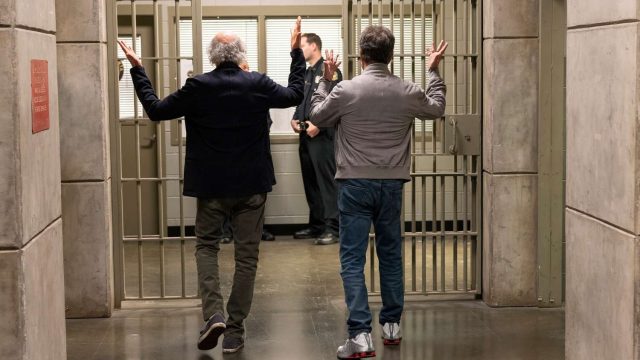Have a tempered reaction to a:
- series finale
- new doc
- long career
- special edition
- classic comedy!
Always worth the highest enthusiasm are this week’s contributors Ruck Cohlchez and wallflower. Send articles throughout the next week to ploughmanplods [at] gmail, post articles from the previous week below for discussion and Have a Happy Friday!
The Ringer’s Ben Lindbergh asks – are we ready for a post Curb Your Enthusiasm world?
In escaping the strictures of social niceties and industry norms, he also transcended the typical limitations of a sitcom creator or character. That’s partly because his sitcom and real-life personas are so intertwined. (Though they aren’t identical; imagine TV Larry with multiple kids.) But it’s mostly because we look to him not just for laughs, but also for his rulings on human behavior. He’s a humorist and an amateur ethicist—or plays the latter on TV—but he’s really a referee, a guy we go to when we want to know what’s out of bounds. (Even though his character gets called for fouls so often.)
Tasha Robinson reviews the timely documentary Girls State for Polygon:
By comparison with the newer doc, Boys State feels far more internal and self-focused. The central subjects in that documentary similarly lose some of their naiveté and optimism about American politics, but it’s solely because of interactions with each other and their own political system. By contrast, the subjects of Girls State are trying to express their confidence about their power and impact in the world, while simultaneously watching their country deny them rights over their own bodies and emphasize their powerlessness. There’s a particularly uncomfortable irony in watching them working to piece together their own political beliefs and futures while their government is shutting down their options.
Readers of The Guardian submit questions to Keith Allen about his acting career, and neither side passes up the opportunity to be cheeky:
How impressed have you been with Lily’s acting? Is she a better actor than you? [Allen:] It’s subjective, so I leave that up to your readers. Have I ever given her any acting advice? You must be joking. I don’t think it would be of any value. I could understand it if we were in a film together and discussing work. But when you go to see one performance, you just stand around being proud. What would be my advice for any up-and-coming actors? Get a job. I think something like 86% of actors aren’t working for an inordinate amount of time. So you need something to stop you feeling depressed. Take up a bit of carpentry, being an electrician, a plumber, anything. Nowadays, you’d be an Uber driver. I was a coal miner. I used to run a mobile bar. In the early 80s, my [then] wife Alison [Owen, now a film producer] would find out where the parties were after the pubs shut, stock up on booze, then go sell it. I’ve been a butcher, a silkscreen printer … I’ve done everything.
For ReverseShot, Greg Cwik details the new material in The Abyss: Special Edition and what it changes from the original:
The film now opens with a quote from Nietzsche: “…when you look long into an abyss, the abyss also looks into you.” This simple sentence instantly clarifies the new tone, or rather the spirit of the film as Cameron intended; the film, a half-hour longer, is now slower and more loquacious, yet still perpetually simmering with the threat of violence, both articulated and reticent, that, when it erupts, not just as dictated by Hollywood blockbuster regulations but because the reason and rhythm of every scene carefully accrues into inevitability, packs a much bigger emotional wallop.
At The LA Times, Meredith Blake details the history of Strangers with Candy:
They imagined all the scripts were written by a middle-aged woman named Jocelyn Hershey Guest, their own version of J.D. Salinger alter ego Buddy Glass, the voice of several of the author’s short stories. “In the world where she’s writing, these are the right moral choices,” Colbert says. “That’s why in our mind, they all have an internal consistency. And also it freed us up from thinking that we were writing this bad stuff. It was all Jocelyn doing it.”


